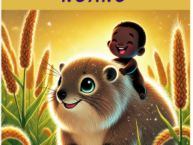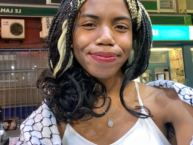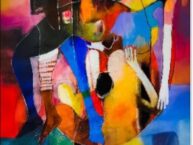 Blessing J. Christopher lives in Nigeria. She is freelance writer and blogger.
Blessing J. Christopher lives in Nigeria. She is freelance writer and blogger.
This thing happened in stages. First, the rain grew reluctant and visited us only once a year, but one year it stopped coming altogether. Then the sun became a spiteful ball of fire because there was no rain to challenge its authority. The earth, thirsty and desperate, took to sucking dry the plants it had once nurtured, had once given life. People woke up one morning and found that the king had sent fifty men to guard the drying river, that they had to suffer long lines to receive drops of water in small clay bowls.
***
The morning they came knocking, Mother hugged me to her bosom and said not to open the door.
“They want all boys to gather in the village square,” I said, afraid that their insistent pounding would split the door in two.
“It is a trap!” Mother said, her eyes wild like forest fires. “Please don’t fall for it!”
I kissed Mother’s forehead and walked out of the hut.
When I reached the square, the crowd did not part for me and the women did not spit in my direction. It seemed like no one remembered that an outcast like me had no place in the village. Someone pushed me towards the circle of boys and I stumbled in. The circle was smaller than it used to be; too many boys had dropped from thirst and hunger. The ones left to form the circle had scanty mud-coloured hair, and weary eyes that roamed in bottomless sockets. Their stomachs were hollow concaves, rendered so by years of emptiness. Their skins had become threadbare coverings for bones that barely held them up.
Oku arrived. Before all this, Oku swirled like a whirlwind whenever he had a message from the gods. He would dance and shake his rattle and chant incantations. He used to wear skirts woven with the greenest palm fronds, and they would whip his ankles as the messages took hold of him and shook him. Now he had a piece of sun-dried dog skin covering his loins. Oku looked frail, like a gust of wind could knock him off his feet and fling him into the barren bushes. He stepped into our circle and crouched over his charms spread out on the floor, mumbling incantations he used to wail out loud.
I scanned the crowd for Mother, but she was not there. Other mothers and fathers and sisters huddled in groups outside the circle, their faces devoid of hope. The king was in the square with his family. He sat on a chair held up by young men whose legs quaked under them. The king’s five sons flanked him; the princes were too important to join our circle.
“One of you will become a hero,” Oku said. “The gods will appoint one boy to go and fight the demons that stole our rain. The chosen one will save us from hunger and death.”
Oku rose to his feet, his bones crackling as they locked into place. He toddled inside the circle, peering into every boy’s face. He walked past me, but his eyes remained fixed on a point beyond my shoulder. He did not stop to look into my eyes like he had done with the other boys. His breath, more sickening than the stench of a hundred rotting carcasses, made me take two steps backwards. He walked back to the middle of the circle and crouched over his charms.
“The gods have named their hero,” Oku said, his voice a mere rattle in his bony chest. “Iquo Asuquo’s boy will help bring back the rain.”
The circle dissolved as the boys fell back and went to stand with their families. The king smiled and crooked his finger at me. There was no shock of recognition in his eyes like when, some nights before, I had crept into the village and had bumped into the king’s entourage returning to his palace. From his startled face when he saw me that night, one would have thought the king had seen a ghost.
I went to kneel in front of him.
“You are our hero,” the king said, smiling. “We thank the gods for choosing you to end our suffering. From this moment until the day you depart to the great spirit world to fight the demons that caused us this great calamity, our warriors will train you in the art of war. You will live with me in the palace because the gods have made you a king!”
I scanned the crowd for my mother, but I could not see her in the sea of starving faces. I wanted her to see how I had become the saviour of this village that had thrown us into the forest.
The warriors came and led me away.
***
My mother was a storyteller. She descended from a lineage of court orators who could recite stories dating back to when Abasi Enyong dropped the first human beings on earth. Although she could not practice her craft, which was a job for men, she thought to pass this skill to me. She taught me the most important lesson in the art of storytelling: a great story had a wonderful beginning but had no end.
“Everyone goes home when the story ends,” she said. “An endless story will keep your listeners up at night.”
As a child, , I begged mother to tell me the story that was dearest to her heart. Her eyes misted over as she considered my request.
“One day you will hear it,” she replied, her voice a mere sigh.
When the time was right, Mother began to weave the story with words. And in her eyes, I saw each character she had created in her head. I could see their passion, their jealousy, their rage. When she started the story, her expressive face kept me rooted as if I had become a tree.
Once upon a time, a beautiful girl lived in a kingdom close to this forest. People said that the peaks of her proud breasts looked up at the sky and smirked at the sun. And when she walked, her waist undulated to music that no man could hear, music the gods played for women they desired but could never have. Men fell at her feet and kissed her toes and pledged to make her their only wife. She pleaded with them to give her time to go to sleep on their offers, but she knew she could never marry these ordinary men. The gods had revealed to her that she would marry a king and birth another king.
The night I became a hero, the king threw a party and invited all the elders. I stood beside the throne as palace maidens served pieces of dried goat and dog meat. The guests tore into their food like wild animals. The maidens returned with gourds of water, causing the elders to shove each other in order to get to the overflowing gourds. The king told them that because it was a feast, they could drink without worrying about the supply. For the first time in years, these people drank more than the few drops the king’s river guards allowed every villager.
That was the first night I had ever spent without my mother. I lay in an empty hut in the palace and wondered if Mother knew the gods had chosen me. No one ventured that deep into the forest. On those nights when the moon was full and people gathered in the square for whatever moonlight entertainment their empty stomachs and weak bones allowed, I would sneak into the village and gather news whispered into hands cupped around ears. This was how we knew everything that happened in the village.
I imagined mother lying alone in our hut, her voice caressing the night as she sang.
***
In the morning, the warriors came to the palace and my training began. I learnt war songs and dances. They taught me to throw spears and swing axes. Oku called me to his shrine. He swirled ufofop in his stinky mouth and sprayed it into my eyes. The warriors held me to the ground as Oku dug his barbed fingernails into my back and scooped out raw pieces of my flesh. He rubbed in potions that stopped my blood from flowing out and soaking the earth. I did not cry out. Only cowards cried in pain. Oku blended charms into the holes he had carved on my back, and I endured it because it was an ancient ritual known to transform ordinary men into immortal warriors. But in all this, Oku’s eyes avoided mine.
The king laughed the day I told him I wanted to see my mother before my journey to the spirit world.
“You are to have no contact with any woman,” he said. “Women have a way of tainting things they touch. You will stay in the palace until the day you leave.”
I waited for the day with fear and courage coursing my veins. Would I return alive? In whose care was I leaving Mother? Who would listen to her stories? Right then, all I wanted was to return a hero and have my exploits made into songs.
Stories of the girl’s beauty soon travelled to the royal palace. It was not long before the king’s two sons joined the long line of young men asking for her hand. Both princes were fine young men of great height. They could dance like fire in the wind. In wrestling matches, no wrestler could make their backs kiss the earth. Their farms yielded so many yams that their barns rose into the sky and fought for a place with the sun. The princes wanted the girl, but a woman was allowed only one husband. The girl chose the elder prince because his melodious singing voice caused liquid fire to pool between her legs, and because it was his destiny to succeed his father as king. Remember that she had a revelation that she would marry a king and give birth to another king? The younger prince swore to get his revenge; no one could reject him and live to laugh about it. He held on to his grudge even after the girl and the other prince welcomed a son.
I followed Mother as she told this story. We walked the forest and gathered dry leaves to cover our beds of weary vegetables, hoping that by shielding them from the angry sun, the vegetables could win their struggle against the unyielding earth.
“Are we ever getting to the end of the story?” I asked Mother.
“I may tell you if you help me inspect the traps tomorrow,” she said, smiling with her eyes. “Besides, what’s the rush? An endless story teaches you to hope.”
***
Rain clouds appeared two days to the day I was to leave. We all came out with our faces turned upwards. In our hearts, we begged the sky to release the rain it held captive. Everyone crouched back into their huts when the sky cleared and the sun emerged to mock us for holding on to hope.
“This is a good sign,” the king said behind me. “This means that the rain is within reach. You come from a lineage of kings and brave warriors, my boy. I know that you will bring us the rain.”
***
In the thick of the drought, Mother had gone to gather dry twigs for firewood, but the gods rewarded her patience with a gift. She found a brook in the heart of the forest. The spot where the water bubbled out of the earth had been dry the day before.
“The gods have heard the groans of a poor widow,” she said, scooping the water in her cupped palms and laughing so hard her body shook. We kept our water a secret because the people choking to death on their parched, swollen tongues would prefer dying to drinking water from the evil forest. Our beds of drab vegetables turned green. Our wild goats birthed new kids all over the forest. It baffled me that water brought uncountable blessings.
***
On the day I left for the spirit world, villagers stumbled from their huts and came to squat in the square. A line of warriors led me into the middle of the arena and left me facing Oku. I wondered if Mother was squatting in the crowd. She had stayed away from the village since the day they threw her out. Parts of her unfinished story came into my mind as Oku swung a smoking clay pot around my head, muttering incantations.
After the death of the old king, the beautiful girl’s prince was ready to ascend the throne. Some days to the coronation of the elder prince, people went to the river and found a woman’s body floating there. Some boys went to the council of elders to say they had seen the man who had drowned her.
The story went that the elder prince had left his wife and son in the stillness of the night and had gone to make love to the dead woman. They said that the woman had refused his advances because she was someone else’s wife. They said that the elder prince had exploded in rage. He had grabbed the woman by the hair and dragged her to the river. No one saw him push her in, though. Some people doubted the version of events that circulated the village, but who could refute a story with many witnesses?
The verdict was death. As was the custom of the people in the story, a murderer had to die the same way he had ended the life of his victim.
Oku handed me a spear and a wooden shield. It was time. The crowd parted as Oku led me out, but this time they made way because I was a hero and not because I was a cursed outcast.
“Go well, warrior!” the king cried out, evoking a limp cheer from his famished subjects squatting before him. Oku led us towards the forest, towards my home. Ten warriors accompanied me. The plan was to walk with me outside the village and leave me to continue the rest of the journey alone.
“You will access the land of the spirit through a hidden portal in the forest,” Oku said. “We are waiting for you to bring us rain in your hands.”
I trained my eyes on Oku’s face, but his nimble eyes scanned the forest and shunned mine. I wondered if he knew things about my journey that forbade him from looking at me.
I passed Mother standing in front of our hut. Her hairless scalp wept blood that coursed down her forehead in thin rivulets. Balls of bloody clumps of hair lay scattered at her feet like she had ripped the strands from their roots.
“You silly boy, she cried. “You silly, silly boy.”
“Keep moving,” Oku ordered in his sapless voice.
“I have to hold her,” I said, allowing my fear to peek through my invisible armour of bravery. “What if it is the last time?”
Oku nodded a reluctant acceptance.
Mother fell into my arms and we sank to the earth.
“Mother, I shall return alive,” I said, sniffing back tears that scalded my throat. “I need to come home to you so that you can tell me the end of your story.”
“This story has no end,” she said. “They held down your father’s head till he drowned in that river for a murder he did not commit. Your uncle stole your father’s crown and banished us to this forest to die. Whose story do you think I have been telling you? It is the story of your life! I knew the day you started sneaking into that village that this would happen. He will have you killed to erase your father’s legacy. He will end your life to stop you from taking your rightful place on the throne. This story has no end because you are alive now. It will end when you die today.”
“Mother, you are not speaking the truth! I am the chosen bringer of rain. I will come back to you after I conquer the demons in the spirit world.”
“Hush, my son,” she said, laughing and crying. “See that hole by the mango tree?” She pointed to a spot in front of the hut. “I buried your spirit in it the day they took you to the square. I know they will not let me have your body, but they cannot take your spirit from me.”
Strong arms pulled me from my mother’s body. The warriors carried me deeper into the forest. There was no need to struggle. Mother did not chase after them; she just stood beside my spirit’s grave and laughed and laughed and laughed.
They tied me to a tree and formed a circle with me in the middle. Oku had chosen me from a circle, now I was to die in a circle. The first warrior’s spear pierced my side and pinned me to the tree. The second spear bored a hole in my heart and fastened me tighter. Oku’s spear came last, and it got me between the eyes.
My feet left the earth and I floated above the heads of my killers. I was up in the air and cascading down the leaves of ageless trees. I dropped on Mother as she wept over the hole that held my spirit; I washed her tears and caressed her naked breasts. I went to the village and healed the cracked tongues of men and women as they came out with upturned heads to receive me in their mouths. I glided down the throats of children and soothed their hot, empty stomachs. I saw the king, joyful as a little girl, as he stepped outside of his throne room to dance with his wives and sons. I revived the plants and watered the animals. I fell in soft sheets; I fell with fury. And they worshipped me because I had become the rain.


